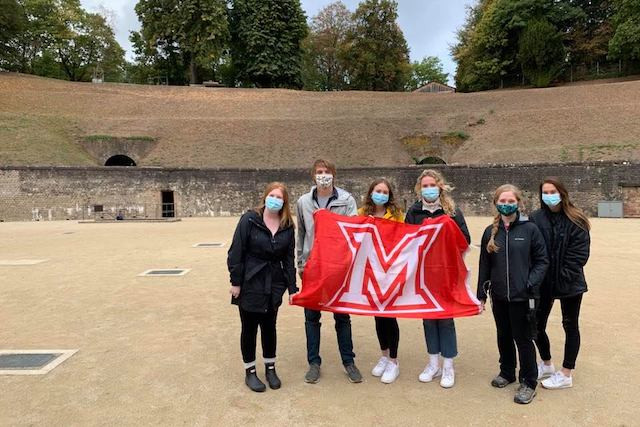Executive director for Mudec Raymond Manes, who took on his new role on 1 July, pointed out during a recent Delano interview that this student was one of eight who were “not directly with us but are teaching in high schools here in Luxembourg [as] their last step to become professors.”
Although that group of eight were normally separate from the Mudec students in any case, the student has been self-isolating. “We have a house next to the Château [where Mudec is based] which we generally used for faculty, [but] we decided relatively early to use that as a quarantine house as needed.” Manes added that the Mudec cook has been delivering lunches to the student, and “we buy stuff for the student for the evening and morning”, and are in regular communication with her. “She is feeling good,” Manes added. “She got a reference from the ministry of health, everything was taken care of.”
Fitting the château with hygiene measures
An additional 22 students are studying directly at the Mudec site this semester, and Manes said early measures were taken to make the château safe in light of the health crisis. Students receive a 7-day supply of masks at the beginning of each week. Until last week the classes were in-person. There are disinfectant gels near or inside all classrooms, offices and the dining hall, and mask-wearing is required in all corridors.
“We have a strict system where cleaning staff disinfect after every class,” said Manes. “They put chairs back up on tables, so if students see a chair is down, they know it has not been disinfected.”

Raymond Manes, pictured here during a Delano interview, took on the role of executive director on 1 July Photo: Delano screengrab
According to the executive director, the largest class size this semester was 11, although given the small student body, most classes only included four to five students. In the cafeteria, there had been a rule of four already in place, which meant Mudec didn’t have to make adjustments when the same rule was outlined by Prime Minister Xavier Bettel on 23 October.
Normally, the semester runs about 115 days, but this semester it has been limited to 90--a way Mudec was able to fast-track students being able to stay in the Schengen zone without getting the normal student visa, which had been delayed because of the health crisis--and students will depart the campus by 18 November, in time for Thanksgiving.
Impact on other semesters, study trips
While this semester counts 30 students, the last group of 111 students had left on 16 March. At that time, Manes said, “We continued all the classes remotely, with adaptations… and we could end the semester that way.” This meant, of course, that with the time difference between the campus in Oxford, Ohio (US), “the best window was between 2-6pm [CET],” which was “either very early for student or relatively late for faculty”. Teachers occasionally gave lectures via video, which was then uploaded on a platform which students could access at more convenient hours.
All summer programmes were cancelled, and “then, very quickly, in April or May, we had discussions [whether] it would be possible to have a programme in the fall.” Given the travel restrictions and students worrying from the US about whether they would have accommodation in Oxford were they to stay Stateside, “a lot of them dropped off by 1 July because we still did not know” how the autumn semester would take form.
Manes added that study tours were also limited to private buses, in order to avoid public transport or flying, and the trips this semester were limited to one-border crossings. Single rooms were used at hotels instead of twin rooms. Over the weekend, Mudec anticipated taking a group of students to Colmar, France, but there were “too nervous this weekend [but are] hoping we can still do it”.
All in all, Manes said the student population is “behaving really well”. For now, they’re busy preparing their next semester.
“Many students want to come, things seem a little bit better here than back [in the US],” according to Manes. “Quite a few cancelled this semester… now they say they should have gone.”
